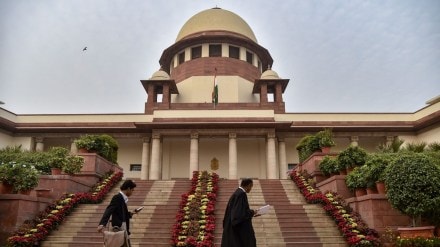When the Supreme Court or a High Court strikes down a single provision of an Act passed by Parliament, it is, at the least, a rap on the knuckles of the government and parliamentarians. When a Bill is opposed on the ground that provisions of the Bill are violative of the provisions of the Constitution, yet the government pushes through the Bill in Parliament, and it is eventually struck down, it is nothing less than a slap on the face of the government. Consider a worse scenario: the Bill is opposed when it is introduced in Parliament and it is referred to a Joint Parliamentary Committee; several members of the JPC write a dissent note arguing, among other grounds, that Parliament is not competent to pass such a Bill; yet the government brushes aside all objections and passes the Bill; and, later, provisions of the Act are struck down or stayed by a Court. It is the worst humiliation for the government and a reflection on the Ministry of Law.
Not Above Constitution
That is the story of the Waqf (Amendment) Act, 2025. On September 15, 2025, the Supreme Court stayed key provisions of the Act. Yet the government put on a brave face and congratulated itself that the Court had endorsed its attempts to ‘reform’ an integral part of the Muslim personal law.
Please see my column Malice Toward Muslims (Indian Express, April 6, 2025). I had referred to several questions raised in Parliament. There were no answers from the government, only obstinate defence of the clauses of the Bill. Thankfully, the Supreme Court has given the interim answers to our questions:
1. Under the Act, a person creating a waqf must demonstrate that he has practised Islam for at least five years. We asked how does a person ‘demonstrate’ that he is practising Islam? The Supreme Court stayed a part of clause (r) of Section 3 until the rules are framed by the State governments for providing a mechanism for determining the question whether a person has been practising Islam for at least five years. (There is no similar provision in the personal laws of any other religion.)
2. If the property dedicated to a waqf is claimed as ‘government’ property, the question will be determined by an officer of the government; until he so determined, the property shall not be treated as waqf property; and if he determined that it is ‘government’ property, he shall make corrections in the revenue records. We asked will it not be a case of the government being a judge in its own cause? The Supreme Court stayed the proviso to sub-section (2), sub-section (3) and sub-section (4) of Section 3C.
3. Once the revenue records are ‘corrected’, the waqf will lose its title to the property. We asked will it not amount to appropriating (actually, expropriating) waqf property through executive action. The Supreme Court directed that until the issue is finally decided by a judicial appellate Tribunal and the High Court concerned, the records will not be corrected and the waqf will not be dispossessed of the property, and no third party rights will be created.
4. The Amendment Act provided — in my view, mischievously — that non-Muslims may be appointed to the State Board of Waqfs and the Central Waqf Council, and even as the chief executive officer. We asked will similar provisions be incorporated in laws governing the institutions of other religions? Will Muslims or Christians be appointed to Hindu religious and charitable institutions? The Supreme Court did not stay the entirety of the offending provisions but limited the interim order to ‘not more than 4 non-Muslims out of 22 members of the Central Waqf Council’ and ‘not more than 3 non-Muslims out of 11 members of the State Board of Waqfs’, and ‘every effort must be made to appoint a Muslim as the chief executive officer’.
Humbled, But Not Humble
The Supreme Court heard arguments for three days on the application for interim stay of the Waqf (Amendment) Act as a whole or, at least, the key provisions. It was unusual for the Court to devote three days to a stay application. Further submissions will be heard when the case is listed for final arguments. In the meanwhile, knowing the character of this government, it will nurse its wounds and plot further assaults on minorities in pursuance of its Hindutva agenda.
Malice is writ large on the face of the Waqf (Amendment) Act. If the government were to observe Article 26 of the Constitution scrupulously,
‘every religious denomination or any section thereof shall have the right — to establish and maintain institutions for religious and charitable purposes; to manage its own affairs in matters of religion…’
Any person truly interested in preserving and protecting the multi-ethnic and multi-religious character of the country — especially the Hindus — should fight against the Waqf (Amendment) Act.
India Diminished
The best estimates of 2025 place the Muslim community at 202 million and the Christian community at 32 million of India’s population. While Hinduism is the oldest religion, Christianity and Islam have the largest following in the world. We may believe that we are secular and tolerant, but the world will view India through the prism of India’s laws, government actions, and the people’s social behaviour. The passage of the Waqf (Amendment) Act has diminished India in the eyes of the world.
